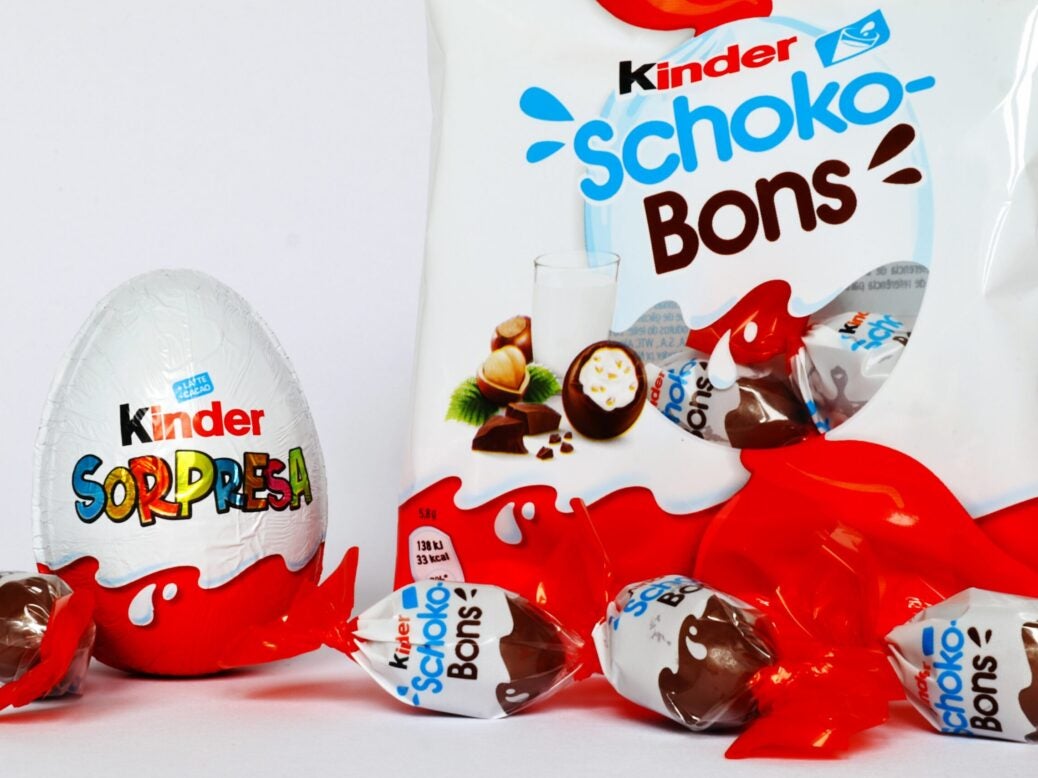Kinder recall: Ferrero raided as prosecutors launch salmonella probe
“We continue to fully cooperate with the authorities as they continue to conduct their investigation” – Ferrero
By Simon Harvey

Ferrero’s Arlon plant in Belgium has been raided by local prosecutors in the wake of hundreds of salmonella cases linked to the facility.
The site was ordered closed on 8 April by the AFSCA, Belgium’s food-safety authority, after the factory was identified as the source of monophasic Salmonella Typhimurium. More than 400 illnesses worldwide have been confirmed from the consumption of Ferrero’s Kinder chocolate products made at the plant, mainly in the UK and Europe but also further afield in North America.
Italy-based Ferrero confirmed the Arlon raid in a statement sent to Just Food, with the privately-owned company’s offices in Belgium and the province of Luxembourg also the subject of the public prosecutor’s attention.
“We continue to fully cooperate with the authorities as they continue to conduct their investigation. As part of this, we can confirm there have been visits by the authorities to the Arlon plant and Luxembourg and Belgium offices,” Ferrero said.
Meanwhile, prosecutors in Paris have launched a preliminary investigation, including a charge of “deception” against Ferrero. France has been one of the most heavily-hit by Kinder-linked salmonella illness in Europe.
Following the suspension of operations at Arlon and an in-depth investigation by the AFSCA, Ferrero said early in May it had requested clearance to reopen the plant, indicating the earliest possible date would be 13 June.
Just Food approached the food-safety authority yesterday (8 June), before the raids came to light, for an update on proceedings: “AFSCA gives priority to the quality and depth of the work carried out by Ferrero on its auto-contrôle, quality and production processes,” it said. “This ongoing work is done in close cooperation with AFSCA.”
Enquiring about the likely reopening date of the Arlon facility, AFSCA referred this publication to Ferrero “for questions concerning the cleaning process and the date of restarting the activities of the factory”. Ferrero did not respond to those requests from Just Food.
The Luxembourg Public Prosecutor’s Office confirmed documents and computer hardware had been seized during the raids on the Ferrero facilities, which numbered six searches, assisted by the AFSCA and police, including the Arlon plant and sites in Brussels and Luxembourg.
“The judicial investigation currently in progress aims to establish possible responsibilities in the management of contamination, compliance with monitoring of the food chain, and in the communication or non-communication of information to the health authorities,” Anne-Sophie Guilmot, a spokesperson for the Public Prosecutor’s Office, said in a statement supplied to Just Food.
Ferrero had delayed reporting the outbreak before initiating a worldwide recall of Kinder chocolate products when the first illnesses came to light in the UK on 7 January.
The presence of Salmonella Typhimurium had been detected at the Arlon plant on 15 December, Ferrero acknowledged in April, noting the “point of origin was identified to be a filter at the outlet of two raw material tanks” and “materials and finished products were blocked and not released”.
The company added: “Ferrero acknowledges there were internal inefficiencies, creating delays in retrieving and sharing information in a timely manner. This impacted the speed and effectiveness of the investigations.”
In an update on 3 June, the European Centre for Disease Prevention and Control (ECDC) said there were 370 confirmed cases in the EU and the UK, and a further 22 probables. And another 53 have been confirmed in Switzerland, Canada and the US.
The UK is the hardest hit, with 122 confirmed cases followed by France with 118 and 52 in Belgium.
“This outbreak is characterised by a high proportion of hospitalised (about 40%) cases and some cases with severe clinical symptoms such as bloody diarrhoea,” the ECDC said. “Based on epidemiological and microbiological investigations, specific chocolate products from a Belgian chocolate factory have been identified as likely vehicles of infection.”
The Paris Prosecutor’s Office opened its inquiry on 25 May in conjunction with Foodwatch, the European advocacy group engaged in protecting consumer rights.
Charges against Ferrero include “deception aggravated by the danger to human health, involuntary attacks on physical integrity and endangerment of the lives of others,” the prosecutor’s office said in a statement.


 eatmaker@list.ru
eatmaker@list.ru